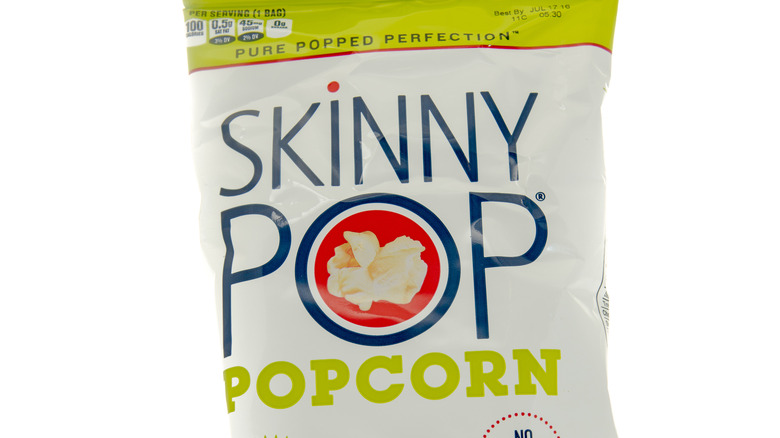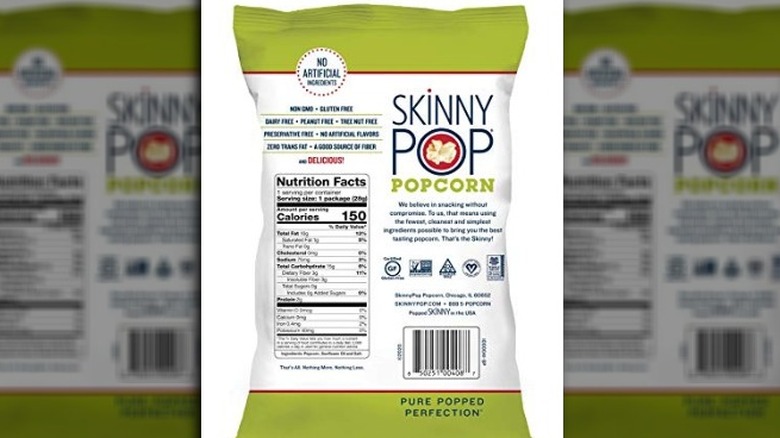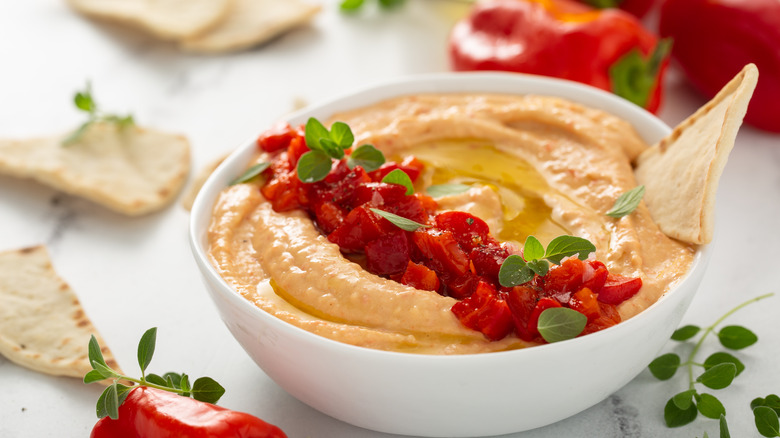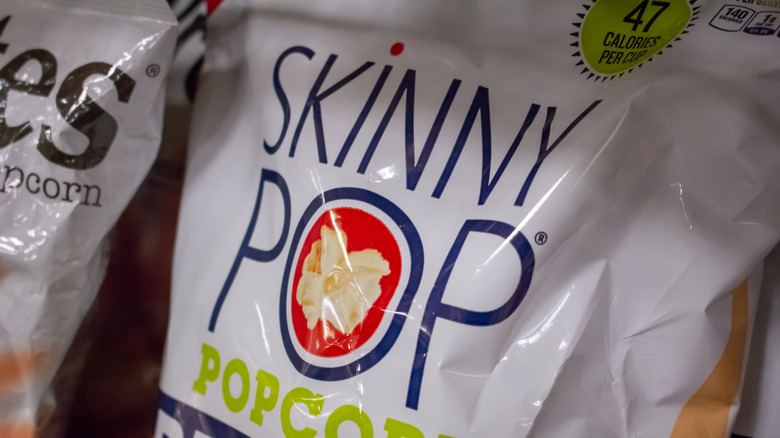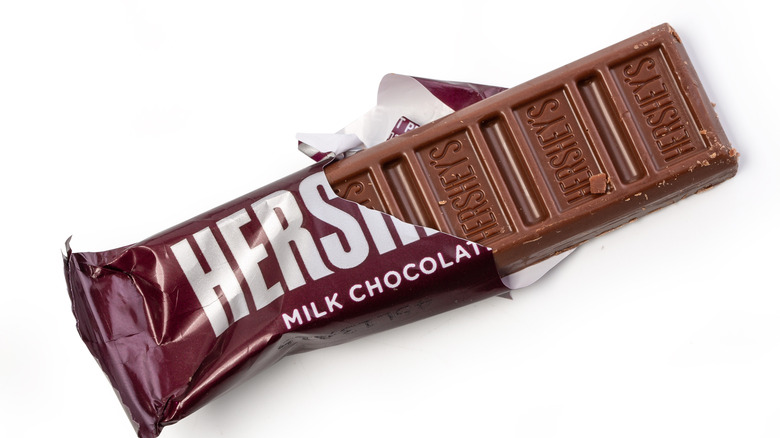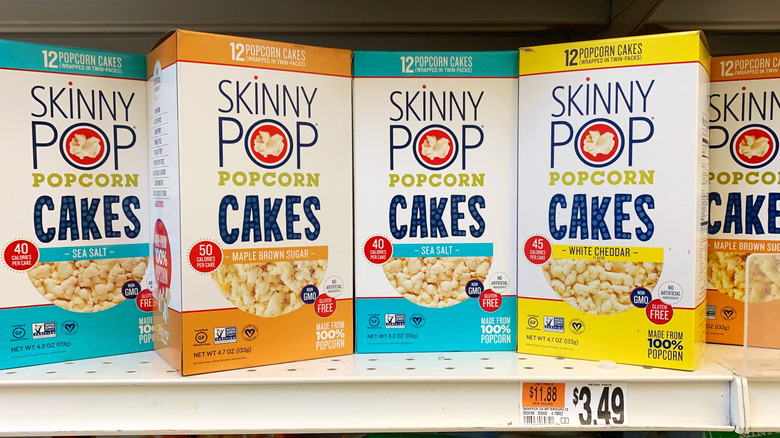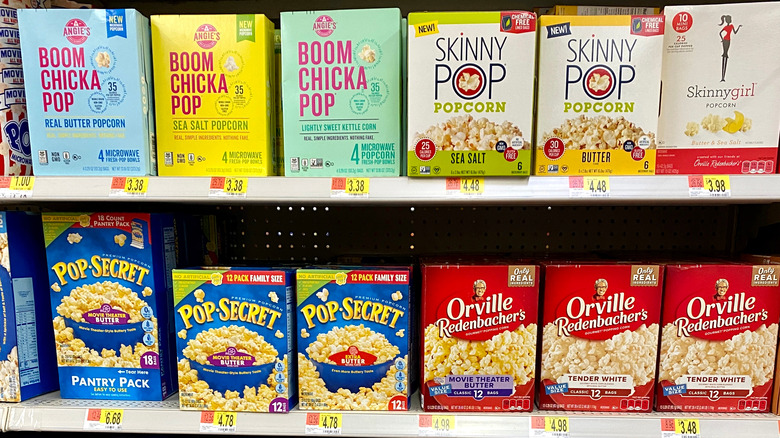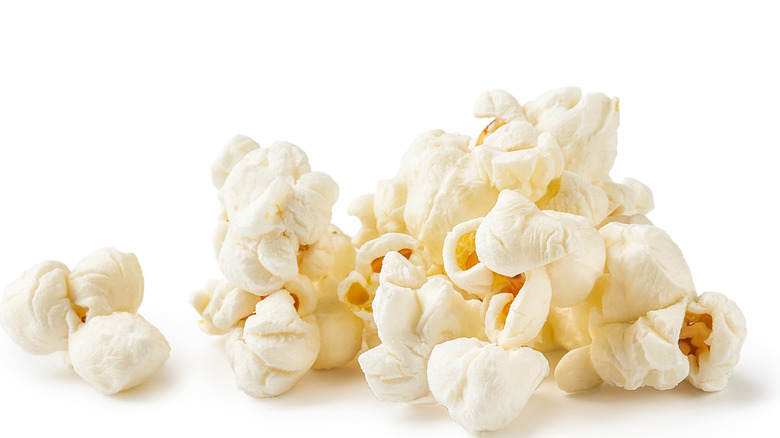The Untold Truth Of SkinnyPop
The popcorn business has come a long way since Orville Redenbacher sold stove-top kernels in a pan. People haven't needed to pop their own for nearly a decade, when the business of ready-to-eat, bagged popcorn really started to boom. Pre-popped popcorn became so popular, in fact, that the Redenbacher company itself eventually jumped on the trend. But one of the leading names in store-bought popcorn, undoubtedly, is SkinnyPop, a popcorn brand that promises to not only taste great, but be better for you compared to its rivals. Now, whether or not that's actually true has been a topic of debate. SkinnyPop has even been sued over the claim and, admittedly, their definition of "skinny" isn't based on traditional nutrition facts you see on the side of a box.
Nevertheless, there's no denying SkinnyPop is a major player in the popcorn market. The Hershey corporation acquired it for $1.6 billion in 2017 and, four years later, SkinnyPop seems as in-demand as ever, with its reported 2021 profit margin over 23%. It's also caught on in pop culture, at one point becoming the go-to snack for binge-watching hit TV shows. How did SkinnyPop get here and what secrets could it be hiding? Read on for SkinnyPop's untold truth.
SkinnyPop is not actually that "skinny"
Let's get this out of the way. SkinnyPop probably isn't any healthier for you than its competitors. According to Consumer Reports, it's actually higher in both fat and calories. SkinnyPop has wiggled its way around the numbers by stating that its definition of "skinny" is simply having less additives. "To us," SkinnyPop says on its website, "that means using the fewest, cleanest, and simplest ingredients possible to bring you the best tasting popcorn. Whole grain popcorn, natural sunflower oil and the perfect amount of salt combine together to give you a delicious snack that you can feel great about eating everyday. That's the Skinny!"
SkinnyPop co-founder Andy Friedman has emphasized this in interviews, defending SkinnyPop's health claims. "We tried to make a better-for-you product that was skinny on ingredients," he told the podcast Bootstrapping America. "Original SkinnyPop only has a premium popcorn kernel, sunflower oil and salt." He adds that, because it contains only three ingredients, SkinnyPop "happens to be better for you." That explanation wasn't good enough for two consumers from San Mateo, California who sued SkinnyPop in 2014, accusing the brand of misleading claims about being healthier when, in truth, they believed SkinnyPop was basically no better for you than "junk food" like potato or corn chips. The lawsuit was later dismissed.
Before SkinnyPop, its founders started a caramel corn company
SkinnyPop's two founders, Andy Friedman and Pam Netzky, didn't come from the food industry at all. Both were struggling entrepreneurs who had tried their hands at various unsuccessful ventures first. Netzky had aspirations of becoming a professional golfer before starting a spa company that never took off. Friedman, for his part, came from a finance background. Both based in the Chicago area, they teamed up in 2007 and launched Wells Street Popcorn, a popcorn brand that, ironically, was anything but wholesome. Intended to rival a local brand called Garret's, Wells Street Popcorn featured high-calorie caramel and cheese flavors.
"We had a nice little business," Friedman has said, "but we were very off-trend. And we knew we had to come up with a better-for-you popcorn option." With the rise of the healthier snack wave, they pivoted to create SkinnyPop. They eventually divested themselves from Wells Street to focus on their new brand, but credit the experience with giving them valuable know-how of the popcorn business, especially how to make it more affordable to shoppers. "With Wells Street, we bought the most expensive ingredients," Friedman explained to the Chicago Tribune. "To sell that in a grocery store, you'd be selling a little bag of caramel corn for $10. Plain popcorn works because of the ingredients. You can use unbelievably expensive sunflower oil, but you don't need much with plain popcorn."
The healthier snack food trend started years before SkinnyPop
Compared to other brands, SkinnyPop was pretty late to the good-for-you snack game. The Daily Meal reports that starting in the 2000s, general concern about trans fat became a fad and eating better between meals became a bigger priority to people. In addition to popcorn, snacks that claimed to be healthier — like greek yogurt, pita chips, and pretzels — started flying off the shelves. Yahoo also named smoothies, low-carb bars, lower-calorie snack packs, and frozen yogurt among the most popular treats of the decade. So by the time SkinnyPop launched in 2010, there was already plenty of competition.
But were these snacks actually wiser choices or simply the result of clever marketing? Partly, it seemed to depend on portion size. Calling it the "Snackwell's Effect," named for the brand of cookies and chips that claimed to be lower in calories, Consumer Reports in 2009 cited studies that showed people were more likely to eat larger portions of foods they believed to be better for them, thereby nullifying any intended effort to save calories. In more recent years, people have come out against some of these brands, with one writer claiming in a 2020 Eater post that the "Snackwell's Effect" had damaged her relationship with food and "ruined my childhood in the process."
The name SkinnyPop was brainstormed in five minutes
The SkinnyPop name wasn't created by advertising execs or from the results of a focus group. While speaking to the Hyde Park Angels podcast, co-founder Andy Friedman says it was actually born on the fly. "We sat in the office. We came up with the name in about five minutes or less. There were a few other names out there that we liked, but SkinnyPop was the one we stuck with."
And while the name certainly is catchy, it's also been quite controversial. In addition to the lawsuit filed by two dissatisfied customers who claimed it was deceptive, industry experts also noted the brand's somewhat confusing message. "Don't expect SkinnyPop to make you skinny," Marketwatch said in a 2015 report that asserted it was actually higher in both calories and total fat than other brands. Still, credit where credit is due when it comes to SkinnyPop's wordplay, one person recently posted on Reddit. "Skinny Pop has made a whole ass successful brand with huge profit margins by carefully advertising the health benefits of plain popcorn," the person commented. "It's kind of genius."
At first, SkinnyPop only came in one flavor
SkinnyPop started off slowly, with just one original flavor when the brand first launched. By 2014, however, three more had been added: black pepper, cheddar, and sweet. Plans were already being made to roll out even more. "Certainly, we're going to continue to expand in the popcorn category for SkinnyPop," co-founder Andy Friedman said at the time. "But I think SkinnyPop as a brand can do a lot of things."
He wasn't wrong. In 2016, Amplify, the parent company SkinnyPop later formed, and branched out even more by acquiring the tortilla chip brand Paqui. That same year, SkinnyPop, by now a seasoned player in the popcorn market, seemed ready to start having a little fun. It rolled out two spunky, non-traditional flavors: dusted dark chocolate and jalapeño. Editors at Delish raved over both, marveling at how closely dusted dark chocolate tasted like a real cookie and how spicy (but not too spicy) the jalapeño felt in their mouths.
Hershey bought SkinnyPop for a stunning $1.6 billion-dollar payday
You wouldn't necessarily think a company like Hershey, known primarily for its chocolate, would be interested in a snack brand like SkinnyPop. But SkinnyPop's growth potential apparently proved too hard to pass up. In 2017, Hershey acquired Amplify, SkinnyPop's parent company, for a whopping $1.6 million. Doing so kept Hershey up with the times, CNBC claimed, reporting that American snacking trends were moving away from candy and cookies in favor of salty or savory options, including popcorn. Two years earlier, it had acquired beef jerky operation Krave, then so-called healthier chocolate label barkThins. And several years after its SkinnyPop acquisition, Hershey's also purchased Pirate's Booty, another popped snack food brand in the better-for-you category.
Hershey wasn't the only major corporation attempting to change its course and to cash in. Campbell, a brand known mostly for its soups, bought pretzel company Snyder's, while Kellogg and Mars each went into business with RXBAr and Kind Bar, respectively. For Hershey, both SkinnyPop and Pirate's Booty proved profitable investments. As recently as 2021, consumer demand for both had increased steadily.
SkinnyPop's founders became local celebrities in Chicago
SkinnyPop co-founder Andy Friedman once confessed the brand's profit's barely paid his phone bill. But by 2016, it was clear that he and co-founder Pam Netzky had started living quite large when he put a $3.8 million home in the Chicago suburb of Glencoe on the market. Per the listing, the house Friedman shared with family, set on 1.1 acres, featured no less than two master bedrooms, seven bathrooms, a media room, and a sports facility.
Meanwhile, Netzky, and her brood, including wife Ashley Hemphill, had become one of Chicago's "power families," according to local lifestyle magazine Modern Luxury. Their home, per Windy City Times, located in the tony Chicago neighborhood of Lincoln Park, was worth a cool $10.6 including both the structure and the land. And Netzky apparently became a fan of flying private. In 2016, she purchased a stake in the jet company Blue Sky, having been so impressed with her own experience, she wanted in on the business. "I love the service," Netzky said in a statement. "They always deal fairly and they respond to me in seconds, often through text message, which works well for my busy schedule."
The TV Show Scandal started a SkinnyPop and wine-pairing fad
Olivia Pope, the lead character on the ABC series, "Scandal," was arguably one of the most popular fictional characters on television during the course of its seven-season run. And how did Pope, a top-level government "fixer," like to wind down after a long day of putting out political and public relations fires in the Oval Office? With a big glass of wine and a bowl of popcorn. SkinnyPop was quick to jump all over the marketing potential of this pop culture moment, releasing a suggested SkinnyPop and wine-pairing chart to accompany the show's latest season. Depending on the viewer's favorite popcorn flavor, SkinnyPop would offer their recommended vino.
SkinnyPop's timing and cleverness paid off. Not only did bloggers promote the wine pairings, stars of the show soon turned into outspoken SkinnyPop fans. Bellamy Young, who played the First Lady on "Scandal," admitted it was one of her go-to guilty pleasures while actress Katie Lowes, whose character was Olivia Pope's right hand, shared that her mom served up SkinnyPop for the series finale, telling E! News, "My mom's got a really thick accent and she's like, "I got a bottle of wine. I got us a bag of SkinnyPop for tonight."
SkinnyPop now has over eight flavors plus popcorn cakes and chips
According to its website, SkinnyPop officially comes in eight flavors including original, two kinds of white cheddar (one with real cheese and one dairy-free), butter, lime, sea-salt and pepper, and two versions of kettle. Don't let that list fool you. In addition, SkinnyPop also rolls out seasonal and limited-edition flavors. During the holidays, it's featured white chocolate peppermint and gingerbread cookie popcorn. Yes, they have more calories than the original flavors but, as blogs have pointed out, less calories than most other Christmastime sweets.
In 2020, to celebrate the brand's tenth year in business, SkinnyPop debuted a birthday cake flavor that promised a party in your mouth but, once again, at the cost of a higher sugar and calorie intake. And in recent years, the SkinnyPop brand has burgeoned way beyond bagged popcorn. It now manufactures a wide assortment of chips, popcorn cakes, and mini-cakes as well. If you like your popcorn hot and have a few minutes to spare, you're also in luck. SkinnyPop now sells microwave popcorn, too.
The team behind SkinnyPop is still in the health food business
Thanks to the reported hundreds of millions they made from SkinnyPop, it's safe to say its co-founders, Andy Friedman and Pam Netzky, were probably set for life. But as it turns out, better-for-you nutrition seems to be a passion. Since moving on from the day-to-day running of SkinnyPop, both continue to invest their time and money into newer health companies. Friedman advised one of his young Chicago neighbors on the creation of Quevos, a high-protein, low-carb, egg-based snack chip In 2019, Netzky joined the board of directors for COCO5, a hydrating sports drink that comes in a variety of flavors and relies on coconut water to provide valuable electrolytes.
And while she hasn't confirmed it, Netzky's also getting into the marijuana business, according to the Chicago Sun Times, having been granted a license to grow, infuse, and transport it for pot-related business purposes. "I'm an entrepreneur in my blood," Netzky has said. "It's very hard and very stressful, and there are a lot of sleepless nights. It's a completely different life — it isn't for everyone. But when you're doing it right and it's working, it's fun."
SkinnyPop now has more competition than ever
Sure, SkinnyPop is still successful, but it had better watch its back. The snack food market is more cutthroat than ever and there's not room for everyone in the supermarket aisle. Before the chicken sandwich wars of 2019, there was the so-called "popcorn war" of 2017 when Snyder's, one of SkinnyPop's competitors, bought a U.K.-based popcorn brand called Metcalfe's Skinny. Amplify, SkinnyPop's parent company, threatened legal action if Synder's brought it to the U.S., citing infringement. A few years before that even happened, Bethenny Frankel's trademarked Skinnygirl got into the popcorn game, partnering with Orville Redenbacher for a microwavable selection of popcorn products.
Beyond popcorn, the healthy snack market is still packed with plenty of other offerings vying for the consumer dollar. Among Prevention's snack food winners in its 2021 Healthy Food Awards: a plant-based queso dip from Good Foods, baked crisps from Pipcorn, sprouted almonds from Daily Crunch, baked legume and vegetable bites from Harvest Snaps, and pickle snacks from SUCKERPUNCH. According to an industry expert, the pandemic shifted consumers' priorities not only towards snacks they believed were better for them, but ones that might also provide better immunity as well.
Fans are divided over which is actually the best SkinnyPop flavor popcorn
Those who liked SkinnyPop's birthday cake variation really, really seemed to love it. Purewow gave it a perfect score on both taste and aesthetics, calling it a "sweet-salty masterpiece," and wondering if the new, limited-edition flavor was, in fact, the brand's best flavor yet. Many consumers agreed, with one Walmart shopper admitting that, while they had had reservations about trying the flavor, it had become their top pick. "This is my favorite flavor yet," another declared. "I really hope this flavor is here to stay."
Other SkinnyPop fans feel strongly about its older flavors. The Betches blog placed aged white cheddar at number one in its definitive SkinnyPop ranking, calling it a miracle and urging its readers to simply "Buy.This.Now." For what it's worth, pepper jack and jalapeño placed second and third. One Redditor heartily agreed, highly recommending the brand's aged white cheddar and pepper jack as well. SkinnyPop co-founder Andy Friedman, for his part, has shown partiality to white cheddar, too, telling the Bootstrapping America podcast: "It's good stuff."
